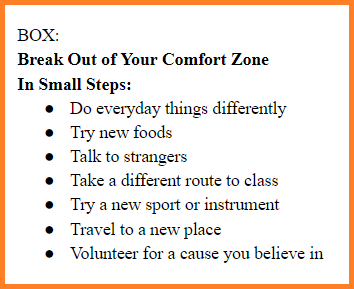In wintertime, we hesitate to leave our bed to brave the cold, preferring warm blankets that cradle us in comfort. This is a good metaphor for the emotional space we call our “comfort zone.” What keeps us in our comfort zones, however, is not freezing temperatures, but fear of embarrassment, hurt or failure. Even so, scientists have found there are good reasons to step out of our comfort zones from time to time.
Psychologists define a comfort zone as “a behavioral space where your activities and behaviors fit a routine and pattern that minimizes stress and risk, [providing] a state of mental security.” As far back as 1908, psychologists Robert Yerkes and John Dodson found that people perform best when their stress levels are a bit elevated–a state they called “optimal anxiety,” which lies just beyond one’s comfort zone.

Staying in your comfort zone is a healthy way to manage stress, but it can also be limiting. Life (and you) can become stale if you don’t break out of your comfort zone periodically. There is no reward without risk, no success without venturing outside your comfort zone–risks (and even failures) are growth experiences.
Personally, I am a very risk-averse person who really loves his familiar habits and routines. Despite this, I have tried hard to step out of my comfort zone as often as possible in recent years, and have gained first-hand knowledge of four reasons why it is good to leave one’s comfort zone occasionally.
Reason #1: You’ll learn to be more confident and sociable.
I would not describe myself with either of these adjectives, but I’d like to be. That’s why I pushed myself to attend an Alpha Lambda Delta networking event last fall, even though it felt uncomfortable at first. Surprisingly, I was able to talk to lots of alumni and learn about interesting career possibilities. Not only did I not freeze up or look awkward, but I am also interested in doing more networking.
Reason #2: You’ll become more open-minded and understanding. In ECG 100, I had to take a huge step out of my comfort zone as we studied slavery in the United States. I was assigned to role-play in the character of a Northern businessman who profited from slavery, a point of view I violently disagreed with. Every speech I gave was excruciating, but in the end, I learned how to play devil’s advocate and understand all sides of an issue.
Reason #3: You’ll discover hidden talents, passions, and abilities that can help you in the future.
I have always intended to pursue a career in video and sound design, which fascinates me. I’m less intrigued by the written word and social media, so when I found out I had to take journalism as a communication major, I looked at it as something to get out of the way. When I was asked to be an assistant editor this semester, I felt it was outside my comfort zone and strongly considered turning it down. But instead, I jumped into it (admittedly with reservations) and now I’m beginning to learn multimedia and layout skills that are more applicable to my interests than I imagined.
Reason #4: You’ll learn not to be afraid of failure, and to make

failures into growth experiences.
Competitive horseback riding has definitely taught me to step out of my comfort zone and learn to handle failure. The first time I competed in the Country Pleasure class after years of showing in the student-level class, I had a rough start: I was “excused” (another word for “kicked out”) from my first class because I couldn’t calm my spooked horse. Although I was upset and embarrassed, I entered another class immediately and successfully finished it. I didn’t place, but it gave me the confidence to keep showing and taught me that one bad performance is not the end of the world.

In my experience, leaving your comfort zone can be difficult and scary, but so worth it. Always trust yourself, because only you know how far you can go out of your comfort zone before learning and growth become anxiety and paralysis. Remember, every time you step outside your comfort zone, your comfort zone gets bigger. Psychiatrist Abigail Brenner said it best: “Settling for mediocrity is an incredibly high price to pay for the feeling of relative safety. Letting your comfort dictate your experience is no way to live.”


